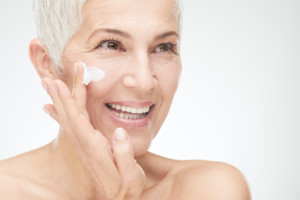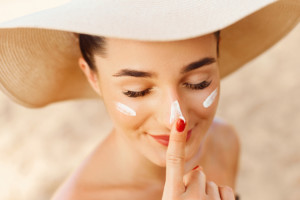By Kelsie Matthews, L.E.

As we all know, sunscreen is one of the most important products to use on your skin, especially in the Texas heat! However, what makes a sunscreen good, and how do you know which one to use? There are thousands of brands, types, and colors out there on the market today, so I’m here to help you figure out what the best fit for you is.
Chemical vs. Physical
Chemical sunscreens work by penetrating into the skin to absorb UV rays and convert that energy into heat that is released by the body. Physical sunscreens consist of minerals that physically reflect the UV rays off of your skin when it hits instead of absorbing into your body.
Chemical sunscreens are typically best for people without skin sensitivities. Since they do absorb heat into the skin, people with heat triggered skin conditions such as melasma or rosacea might find that physical sunscreens are a better option for them. One of the pros to chemical sunscreens is that they do penetrate deeper into the skin, meaning they can last longer while sweating, in the water, or when you are exposed to the sun for a longer period of time. Since chemical sunscreens do not reflect the rays off the skin, they don’t leave you with a white cast in photographs or certain lighting, making them a great option for special occasions.
Physical sunscreens are typically made up of fewer ingredients than chemical sunscreen, and can be more gentle on the skin. Due to the fact that they physically sit on top of the skin, it tends to be less irritating for people with sensitive or acne prone skin. These are also good for people with rosacea or melasma because it reflects the heat away from the skin, making it less likely to flare up those conditions while exposed to heat.
Differences between SPF numbers
Contrary to popular belief, a high number SPF doesn’t necessarily mean it is better. “SPF” stands for sun protective factor, which means that the number stated correlates with how well the product protects you from UVB rays from burning your skin. For daily use, an SPF of 30 or more is really all that is necessary. Anything higher than 30 only provides a slightly higher protection.
Water resistant vs. regular sunscreen
For everyday use, regular sunscreen is perfectly fine. Unless you are a major sweater, or going to be in the water all day, water resistant sunscreen is not necessary. When a sunscreen states that it is “water resistant” that means that it can last for 40 minutes while in the water. “Very water resistant” means that it can last for 80 minutes in the water, making it a great option for beach or lake days. My favorite SPF for the water is the Skinbetter Science Sunbetter stick sunscreen, which is a mineral sunscreen that lasts 80 minutes.
Tinted vs. non-tinted
Many brands nowadays have come out with tinted sunscreens in addition to the traditional clear ones. Tinted sunscreens are great for people who don’t like wearing a lot of makeup but still want a little bit of coverage. Some moisturizers and makeup out there claim to have sun protection, but it is better to keep your products separate to ensure maximum efficacy. Tinted sunscreens are still considered true sunscreens, not makeup or moisturizer, so they are just as effective as non-tinted sunscreen. My personal favorite tinted sunscreen is the SkinMedica Total Defense & Repair, which has an SPF of 34 and amazing coverage, making it great for everyday use without having to cake on foundation.

Whether you choose to go with a physical tinted sunscreen, a water resistant chemical sunscreen, or a non-tinted sunscreen, there’s a product out there that will fit any lifestyle! Do your skin a favor this summer (and all year), and invest in a great sunscreen. It will thank you later!
